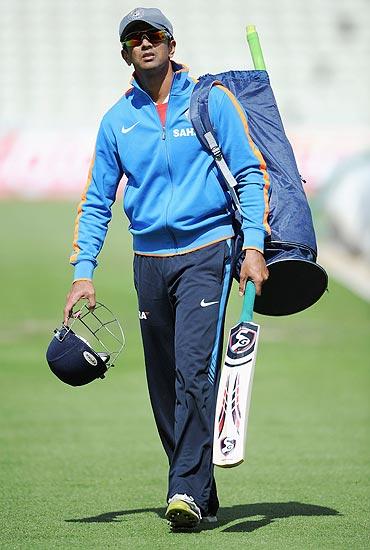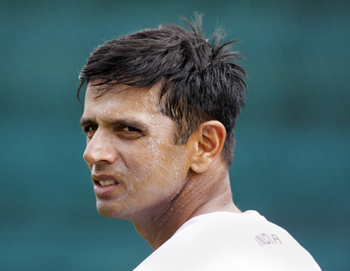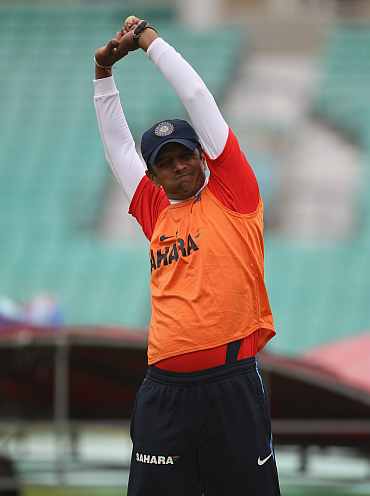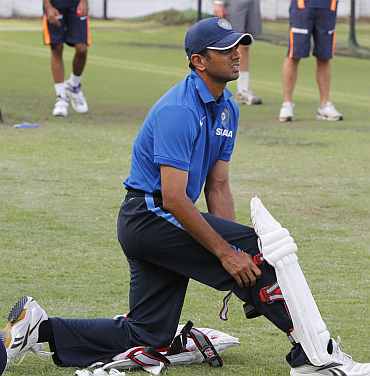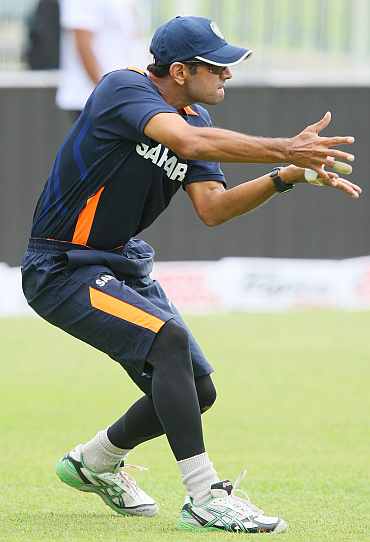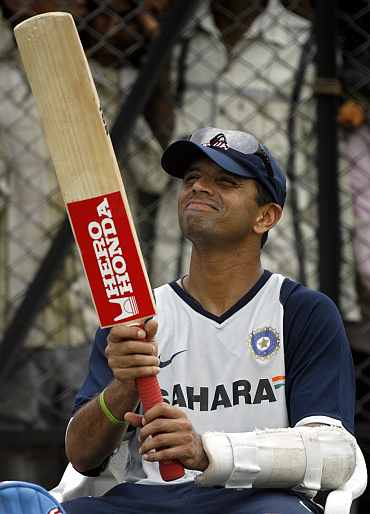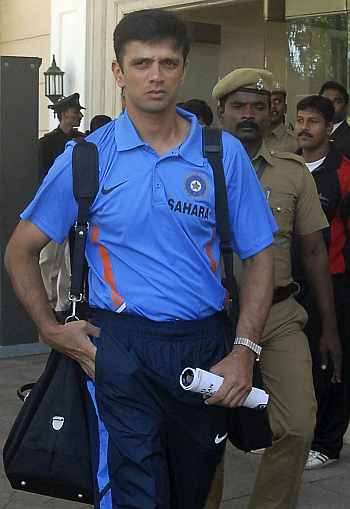 | « Back to article | Print this article |
Rahul Dravid: The unsung one-day wonder
Friday's fifth and final ODI against England will mark the end of Rahul Dravid's illustrious ODI career. Bikash Mohapatra salutes the batting ace whose perseverance translated into success.
A few weeks back, when India was playing a practice game at Northampton, Rahul Dravid was in the news twice, in the space of hours, despite not being part of the team for that particular game.
The first occasion was regarding his selection for the one-day series that followed the Tests.
The 38-year-old had not been part of the ODI side for two years -- since playing against the West Indies at The Wanderers in the ICC Champions Trophy in September 2009 -- and had not even been recalled for the World Cup, which Team India went on to win.
However, the fact that he was the lone bright spot -- he scored 461 runs in the four Tests (@ 76.83), including three centuries and was the only Indian batsman to tackle the moving ball consistently -- in an otherwise vapid effort that saw the team get whitewashed 4-0, prompted the selectors to bring him back.
The fact that he had not officially announced his retirement from one-dayers led to his selection, which, in his own words, was 'surprising.'
The veteran batsman was quick to react. He had assumed he would not be selected again for the shorter format, and, considering the circumstances in which he was, he also did not want to be taken for granted.
An ad hoc press conference was arranged and Dravid announced that he would draw curtains on his career in the game's shorter format after the England tour. The decision had been made keeping his best interests in mind.
Follow Bikash Mohapatra on Twitter @ vickeypedia
Dravid's 344th ODI will be his last
Having not played a one-day match in two years reflected in his performances -- in what is final ODI series.
Dravid has thus far aggregated a paltry 55 runs from four matches (@13.75), 32 of them coming in the second ODI at The Rose Bowl (Southampton).
However, the good news is he doesn't have to worry about the numbers any more. India's fifth game against England at Cardiff on Friday will be his 344th and final One Day International.
Though not a happy one, it will be an ending nonetheless.
Early in his career Dravid was an ODI misfit
It is imperative here to mention that while essentially considered a Test player, Dravid's one-day credentials are no less.
However, the transition was anything but easy.
He was a slow-starter, managing just 63 runs in his first eight matches, following his debut against Sri Lanka in April 1996.
It took him 35 ODIs to register his maiden hundred - 107 against Pakistan in Chennai in May 1997, and when he recorded his 10th ODI ton -- 104 also against Pakistan at Kochi in April 2005, in what his 247th match -- Dravid averaged in the excess of 40 for the first time in the shorter version.
In a version where aggression scores over perfection and slogging takes precedence over technique, Dravid was a misfit.
Dravid adapted well to the shorter format
Patience, a virtue that held him in such good stead in the Tests, was something that went against him in ODIs.
His failure to find the gaps, an oft-used strategy to keep the scoreboard ticking, in the initial stages of his career frustrated many.
It is to his credit though that he adapted well to the format as his career progressed and became a vital cog in the team.
The fact that Dravid has 10,820 runs in 343 matches (@ 39.06), including 12 centuries and 82 half-centuries, corroborates his successful transition from a predominantly Test player to a reliable team member in the one-day set up.
1999 was Dravid's most productive year
The second highest scorer ever in Test cricket also happens to occupy the seventh spot in the ODI list -- only behind Sachin Tendulkar, Ricky Ponting, Sanath Jayasuriya, Inzamam-ul Haq, Sourav Ganguly and Jacques Kallis.
Playing what was his maiden World Cup, in 1999, Dravid finished the tournament's highest scorer -- aggregating 461 runs in eight matches (@ 65.86), even though India failed to make the last four.
In fact, that year happened to be the most fruitful one in his ODI career.
He totaled 1761 runs in 43 matches (@ 46.34) and scored six of his 12 career centuries, including a magnificent 154 against New Zealand at Hyderabad -- his highest ODI score.
Dravid reached No. 5 in the ICC ODI rankings
The 2004-05 period was another productive one, with Dravid aggregating 1025 runs (@ 39.42) in 31 matches (in 2004) and scoring another 1092 runs (@ 47.48) in 30 matches the following year.
In February 2007, at Margao, he became one of the few batsmen to surpass the 10,000 ODI runs mark, against Sri Lanka -- the country he had made his debut against.
Besides, he reached No. 5 in the ICC ODI rankings and captained India in the 2007 ICC World Cup.
Dravid's perseverance translated into success in ODIs
However, things have been anything but hunky-dory in the last few years. Since the last time India toured England (in 2007), Dravid has played in just 16 ODIs, the selectors preferring other options in his place.
This prompted the veteran to concentrate solely on his Test career. However, success in the longer version, coupled with the failure of the young brigade to cope with the moving ball in England, made the selectors go back the player who is referred by many as 'The Wall'.
The recall did not elate Dravid; it simply amused him. More importantly, it made him take a step that would ensure there is no place for such opportunism in the future.
Whatever the result on Friday (the series has already been decided in England's favour), it will mark the end of an illustrious career, of a player whose perseverance translated into success.
And Dravid will move on to add more chapters to an even more remarkable Test career.
